
Emma Frank: So much of being a songwriter, for me, is seeking out solitude. Photo: Shervin Lainez
The Brooklyn-based avant-garde folk artist details the creation of each track from her latest album, revealing a rollercoaster of emotions
New York-based singer-songwriter Emma Frank was born and raised outside of Boston, before moving to Montreal in 2006 to study literature at McGill University. Whilst there she began performing regularly, releasing two critically acclaimed albums under her own name on the Montreal-based label, The 270 Sessions and performing vocals and brass with art-pop ensembles She’s Got a Habit and Malcolm Sailor’s Songs.
After coming to New York in 2015 to perform in Franky Rousseau and Dominic Mekky’s chamber opera, April, Emma decided to move to Brooklyn. It was there she forged her own unique sound, blending elements of folk, R&B, and even jazz to create shifting tempos and winding melodies.
Following the success of her critically acclaimed 2018 release, Ocean Av, Emma returned this year with the new album Come Back. Here she describes each song in turn, revealing a record made with love, lust, self-doubt, commitment and sadness…
I Thought
I definitely have a habit of convincing myself that something is really wrong – someone talks to me the wrong way, or I have a crush, and all of a sudden, I’m thinking, “Well, I guess I’ll have to quit my job, leave my partner, move cities.” Extreme thinking. To this day, my mother reminds me that I have a tendency to polarize things. She would always say, “Don’t throw the baby out with the bathwater,” and I think about that a lot. I Thought is a reminder that we can grow and change and still be committed to those we love and the work we do.
Either Way
Yankee Foxtrot Hotel was one of my favourite records in college, but I hadn’t really delved into other Wilco territory. Aaron Parks showed me this song off Sky Blue Sky. It’s so perfect. That whole record really, but the simplicity and vulnerability of the lyrics really speak to me. I knew I wanted to sing it.
Two Hours
I wrote this song about boredom, and about the guilt I feel about being unproductive at home. So much of being a songwriter, for me, is seeking out solitude so that I can hear my thoughts more clearly and be in meaningful conversation with myself. When I end up making something, I feel happy about this process. Saying no to plans with people, being the person that doesn’t go out very often, often feels worth it if I’m making art that feels meaningful to me. On the other side of that, there’s a lot of time when I just sit at home and stare at the ceiling. Or pop blackheads, or look at Instagram, or pine for my husband, Pedro, to come home and send him endless messages saying, “Miss you,” “Where r u?” etc… In those moments, it feels like songwriting is something I tell myself I do, but really I just sit at home bored, having sacrificed a more normal social life to be alone and bored. “When does solitude become loneliness?” is a question that I have to keep in mind a lot. Am I taking time to check in with the muses, to clear space for myself to act as a medium? Or am I taking time to scroll on Facebook? I wish there was an easier way to know… I guess In a lot of ways I’ve made a commitment to clearing space. And sometimes it leads to songwriting, and other times not.
Sometimes
This is going to be rather long-winded, and maybe too personal, I don’t know! I’m not sure if it’s a Mother’s Day song, but here’s a little background: Sometimes was the first song I wrote after recording Ocean Av. I wrote it maybe a day or two after returning to Brooklyn from Montreal (where we recorded at Pierre Marchand’s studio). I was feeling overwhelmed with gratitude. I was also feeling relief, like a huge weight had been lifted off of me. The year that I was writing Ocean Av was kind of a mental health crisis year for me. I was very depressed and felt like I wanted to die. I think it was the fall before we recorded that I realized I needed to ask for help.
I spent a lot of time on the phone with my parents, and with my good friend and ex-partner, Simon. My husband (boyfriend at the time), Pedro, was so patient, present and helpful. Basically, I felt like I wanted to disappear, and people that I love really came out to support me. Both of my parents really gave me permission to call them whenever it got bad, to not be in that space all alone. My mom has dealt with very serious depression for a lot of my life, but she’s doing well now. So, she was a wonderful resource for me. My dad was great at helping with practical things – like when I feel like I want to die, I really don’t want to call different therapists offices to see if they accept my insurance or have a sliding scale. So, my dad helped me organize a little bit.
I began taking Prozac on Halloween that year and it felt like magic. My mood stabilized, I didn’t find myself in bed crying as often. By the time we recorded Ocean Av in December, I felt ready and mostly stable. I also felt nervous and scared. It was a very therapeutic session and we made music that I love and feel deeply proud of. It dawned on me that I had spent much of the previous year hoping to die, or just to disappear (I didn’t wish myself violence, I just wanted to stop feeling). Surrounded by love and art, and making something with musicians that I admire so much, that we all felt really proud of, I was so overwhelmed with gratitude, with a feeling of connectedness and utter relief that time had passed and things had gotten better.
By the time I got home to Brooklyn, I felt surrounded by love. I was alone, but I could feel my mom rooting for me, and my dad, and Aaron, Pedro, Jim and Simon. So, I wrote Sometimes, thinking about these very real connections that bring me back to reality, and keep me from falling into darkness. At the session, I kept thinking, “Woah, I’m so glad I’m alive! I’m so glad I’m not dead.” It was exhilarating, after feeling bad for so long, and kind of anticipating the worst, to feel so blessed.

Emma Frank: If you see me walking by myself on the street, I will probably be quietly singing to myself
Promises
I got married this year. My parents are divorced. Most of my friend’s parents are divorced. So I wanted to come up with a language or a mantra to help me enjoy my love and my commitment, without feeling overly attached to a storybook narrative or feeling dark about it. I wanted to remind myself that life is complex and there are no shortcuts to happiness – marriage does not mean that I’ve suddenly solved all my problems, or that I’ll never suffer again. It also doesn’t mean that we’re going to be together forever. But it feels good now and all we can do is try our best to do right by each other and see where it goes.
Dream Team
Simon [Millerd, who wrote this song] was my boyfriend in Montreal for three years. We lived together and toured together and he played trumpet in my band. And while it didn’t make sense as a romantic partnership, I love creating with him so much. Music flows through him so effortlessly. He has such a gift. He also has an openness about him that makes it very easy to take risks around him. I’ve always been shy about improvising with other musicians or playing the piano. I’m always around conservatory-trained musicians, and I can definitely feel like my skills are so much more basic. Simon was the first person to ask me to play piano for him, to improvise with him with my voice and piano.
I’ve been drawn to lyric-less vocalizing for a long time. In a way, it started with my interest in “jazz voice” so that I was singing instrumental parts. And I used to really try to improvise in the swing language, but it didn’t feel natural or authentic to me. I spend a lot of time improvising wordlessly on my own, not in a fancy way, but just singing melodies. I really love the sound of an unaffected human voice. If you see me walking by myself on the street, I will probably be quietly singing to myself.
Simon is the first person that has composed specifically for me, which made me feel so special and grateful. Omma, on The People We’re Becoming, is a gorgeous piece on my second record that he wrote shortly after we met for me to sing. He wrote Dream Team for me last year, as a loving meditation, and a reminder that we have a really special creative bond. Often, Simon’s compositions feel ambient and soothing the way that walking next to a peaceful river might feel. He’s also like that to spend time with. He actually released a beautiful record last year called Lessons And Fairytales, and we recorded a few other songs that he had written for my voice. He’s my friend!
See You
Not sure I’m comfy talking about this one but… See You is about monogamy and how to negotiate crush and love feelings when you are in a committed and not open relationship. It feels very taboo to talk about, and I feel guilty even writing about it, but it’s an issue for so many people. Essentially, love feelings are joyful feelings. They make us expand, they make us grow. I’m working on accepting that these feelings will come up, even if I’m wildly in love with my partner, and to not punish myself with guilt for feeling them. But also to be strong in my boundaries and my commitments.
Come Back
Aaron [Parks, who wrote the music] played me his recording of this instrumental song [with the working title] Lilac in Paris and asked if I would set lyrics to it. I was travelling in Europe with my mama at the time, and I spent time walking around Paris, listening to his recording, and thinking about beautiful things and impermanence. Also, lilacs are my favourite flowers, so I felt a strong calling.
Before You Go Away
I wrote this song, initially, to my father. Our communication was really breaking down and I had trouble talking to him without getting upset at something he said. He also has trouble not saying upsetting things. I know he’s working on it. He’s also my dad and I love him very much. We had just had some terrible conversation that ended in me vowing to take some time off from speaking with him. I was just so ready to give up. And it occurred to me, we don’t have time for this. He’s not going to be around forever. If we want to have a non-conflictual relationship, we have to be active participants. Don’t go so long without calling. Don’t only call when you’re feeling sentimental. Don’t let me cut you out. Sometimes it’s at the most frustrating and difficult moments that we really need to push through.
The song took on new meaning the more I sang it. In the studio, I had a really powerful experience singing it – I was starting to feel burned out and frustrated with myself. Lots of super negative self-speak: “You can’t do this,” “You’re not a good musician, artist, etc,” “This isn’t working, this will never work,” kind of thing. Super-unhelpful thoughts. We did so many takes of this song and I just didn’t like how it was going. Then, we had this crazy high-energy, high-intensity moment, where this very powerful realisation made its way through me: that this song was really written to myself. That I needed to come back to the moment, come back to the light, and love myself. I needed to let joy and light in and to let those negative voices go. Funnily enough, the version we ended up using for the record, we recorded a few months later, my husband and I, in our home in Brooklyn. But that acoustic version – just piano and voice – I remember feeling like a ray of light was shining through me.
This new album, Come Back, from Emma Frank is out now. Discover more at emmafrankmusic.com




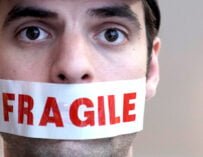
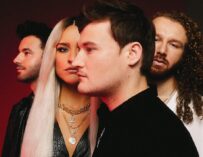



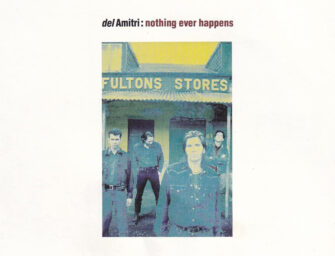

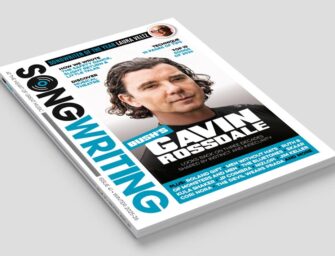
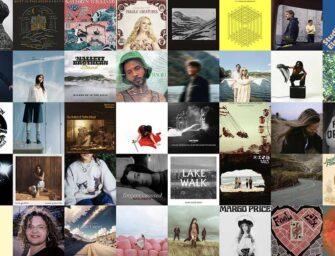




















Related Articles